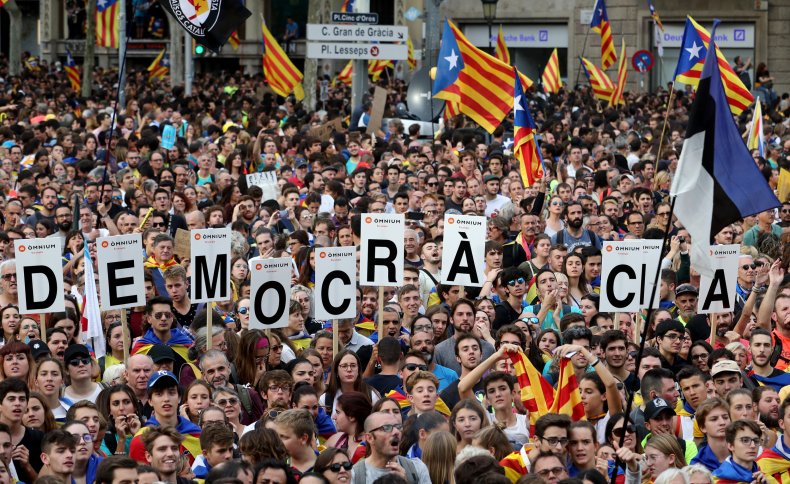[ad_1]
Spain’s relationship with democracy is complicated.
While Spain arrested rapper Pablo Hasél this month for exercising his right to freedom of expression, Russia humiliated the European Union, which Spain is a member of, by highlighting the country’s repeated detention of Catalan political prisoners.
Catalonia, an autonomous region in northeast Spain, has been shaken by violent crackdowns of protesters following an October 2017 independence referendum. At least 800 people, many elderly, were beaten by Spanish police officers as they peacefully tried to vote. Images circulated online, which led to outrage as well as rebukes by several human rights organizations—despite silence from European institutions.
Since then, nine high-ranking Spanish politicians have been accused of sedition and were convicted and imprisoned. Others have been forced into exile, such as former Catalan President Carles Puigdemont (who as an elected MEP accused the European Union of having a double standard).
In a tweet, Puigdemont said, “the Spanish state has contributed to the deterioration of the EU’s international image. Therefore, when we defend the fundamental rights of Catalans, we are also defending the fundamental rights of Europeans and the reputation of the EU, affected by the Spanish drift. When will they notice?”
Catalan MEP Toni Comín, in political exile, noted in a speech at the European Parliament that “Spain is leading the EU to disaster, and you are the face of that, Mr. [Josep] Borrell.”
Several Spanish activists have been persecuted and sent to jail for voicing their opinion. Activists defending Catalan independence outside of Spain have been illegally spied on by the Spanish secret service.
Artists cannot breathe without fearing repercussions. Rappers Valtònyc and Pablo Hasél can attest to that.
Both were prosecuted and convicted by Spanish courts for the crime of singing against the monarchy and allegedly inciting violence and praising terrorism—a charge that has become commonplace in Spain and is used to harass and imprison critics of the regime. Even joking tweets reminiscent of Francisco Franco’s dictatorship can lead to a lawsuit.
Valtònyc fled the country, while Hasél was recently arrested.
Protests erupted all over Spain, complete with police violence against people demanding their freedoms. It’s ironic that one of the judges responsible for Hasél’s conviction, Nicolás Poveda, was an active member and candidate in the 1970s for the fascist Falange Party.
Amid the protests, Spain convicted Elgio, another rapper, for six months. Spain said his lyrics incited terrorism.
All this comes under the complete silence of the European Union.
The EU also has not addressed the accusations of Spanish authorities who claim Russia devised a plan to invade Spain, by allegedly offering 10,000 soldiers to Puigdemont to secure an independent Catalonia.

Sandra Montanez/Getty Images
Against all recommendations, the head of Europe’s foreign policy Josep Borrell visited Russia to discuss the country’s mistreatment of opposition parties. Some EU members, notably Poland and the Baltic states, did not support Borrell’s attempt to engage in constructive dialogue with Russia.
Russian Foreign Minister Serguey Lavrov accused the EU of having no moral ground to criticize the imprisonment of opposition leader Alexei Navalny while holding political prisoners within its borders.
Russia expelled three EU diplomats during Borrell’s visit, sending a clear message that Russia would not accept criticism.
After the disastrous visit, more than 70 MEPs signed a letter demanding Borrell’s resignation, accusing him of causing serious damage to the EU’s reputation.
Spain’s persistent abuse of Catalan activists is not in line with safeguarding the democratic morals of the Union.
European foreign policy has limited instruments and largely depends on the general consensus of its members and on exporting values. One of its member states, however, does not adhere to the democratic principles preached by the Union.
Spain has been condemned by the U.N. Special Rapporteur on torture and has issues concerning minority issues, freedom of expression rights and the treatment of human rights activists. Several NGOs like Amnesty International and the World Organization Against Torture have criticized Spain.
Borrell, who is Catalan, has always defended Spain’s interests. He was unprepared to respond to Lavrov’s provocations. Borrell ultimately could have done very little, given the EU’s silence in the face of Spain’s repression of Catalans—a stain to be exploited by countries like Russia.
His visit demonstrated the EU’s hypocrisy in pointing a finger at Russia without taking care of its own backyard. How can the EU criticize Russia for his handling of pro-democracy activists while incarcerating and persecuting pro-democracy and pro-Catalan independence activists in Spain?
The EU has a lot of homework to do before demanding anything from its less-than-democratic members and neighbors, even though constructively engaging Russia should be a major concern for the block. Unless the EU is able to tackle human rights violations by Spanish authorities, the Union’s foreign policy will remain crippled.
The volatile status quo creates an opportunity for other countries, notably China, to view the injustices of the EU as a green light to continue mistreating the Uyghurs and suppress pro-democracy supporters in Hong Kong.
Raphael Tsavkko Garcia is a Brazilian journalist based in Belgium. He holds a PhD in human rights from the University of Deusto (Spain).
The views expressed in this article are the writer’s own.
[ad_2]
Source link